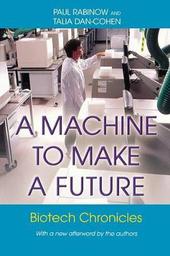
|
A Machine to Make a Future: Biotech Chronicles
Paperback / softback
Main Details
| Title |
A Machine to Make a Future: Biotech Chronicles
|
| Authors and Contributors |
By (author) Paul Rabinow
|
|
By (author) Talia Dan-Cohen
|
| Physical Properties |
| Format:Paperback / softback | | Pages:224 | | Dimensions(mm): Height 235,Width 152 |
|
| ISBN/Barcode |
9780691126142
|
| Classifications | Dewey:338.7660609794 |
|---|
| Audience | | Professional & Vocational | | Tertiary Education (US: College) | |
|---|
| Edition |
Revised edition
|
| Illustrations |
8 halftones.
|
|
Publishing Details |
| Publisher |
Princeton University Press
|
| Imprint |
Princeton University Press
|
| Publication Date |
2 April 2006 |
| Publication Country |
United States
|
Description
A Machine to Make a Future represents a remarkably original look at the present and possible future of biotechnology research in the wake of the mapping of the human genome. The central tenet of Celera Diagnostics--the California biotech company whose formative work during 2003 is the focus of the book--is that the emergent knowledge about the genome, with its profound implications for human health, can now be turned into a powerful diagnostic apparatus--one that will yield breakthrough diagnostic and therapeutic products (and, potentially, profit). Celera's efforts--assuming they succeed--may fundamentally reshape the fabric of how health and health care are understood, practiced, and managed. Presenting a series of interviews with all of the key players in Celera Diagnostics, Paul Rabinow and Talia Dan-Cohen open a fascinating window on the complexity of corporate scientific innovation. This marks a radical departure from other books on the biotech industry by chronicling the vicissitudes of a project during a finite time period, in the words of the actors themselves.Ultimately, the authors conclude, Celera Diagnostics is engaged in a future characterized not by geniuses and their celebrated discoveries but by a largely anonymous and widely distributed profusion of data and results--a "machine to make a future. " In their new afterword, Rabinow and Dan-Cohen revisit Celera Diagnostics as its mighty machine grinds along, wondering, along with the scientists, "what constitutes success and what constitutes failure?" The pathos of the situation turns on how one poses the question as much as how one answers it.
Author Biography
Paul Rabinow is Professor of Anthropology at the University of California, Berkeley. His many books include "French DNA, Making PCR", and "Anthropos Today" (Princeton). Talia Dan-Cohen received a B.A. in anthropology from the University of California, Berkeley.
Reviews"The strength of Rabinow's approach is that we hear the voices of scientists at work. Not only do they describe the science itself, but they also provide their perception of its importance. Rabinow is a skillful interviewer who elicits motivation from his subjects. We are given a rare glimpse into the professional lives of the participants and the energy that drives their scientific and personal decisions."--William A. Haseltine, Science "Paul Rabinow is the leading anthropologist of contemporary biotechnology... It would be easy for him to use his authority to apportion praise and blame, or to develop a magisterial contribution to anthropological theory. But [he] resists coming to artificially neat conclusions... This book's compelling insights should be required reading for everyone who pictures themselves a scientific entrepreneur, or who cares about the state of contemporary science."--Christine Hine, New Scientist "A Machine to Make a Future by Paul Rabinow and Talia Dan-Cohen, a book as impressive as the previous two works in Rainbow's biotechnology trilogy ... Is an in-depth and well-constructed anthropological chronicle of this new Californian scientific enterprise. With his student Talia Dan-Cohen, Rabinow has provided a highly readable account of Celera Diagnostics' formative period ... through a series of lengthy but insightful interviews with the original researchers."--Xuefeng Bruce Ling, The Journal of Clinical Investigation "This book is a good choice for even a layperson to get a grip on the current developments in the world of genomics and how these diagnostics can help health and health care."--Rukmini Rajagopalan, Current Science "This book may signal an entirely new way of viewing scientific innovation in a globalized, competitive environment, integrating new technologies and methodological insights."--Biology Digest "[Paul Rabinow's] interviews are expertly conducted and provide a rich resource that can be mined from a variety of perspectives--including scientific, business, legal, ethical, and philosophical."--George Jannas, Quarterly Review of Biology
|